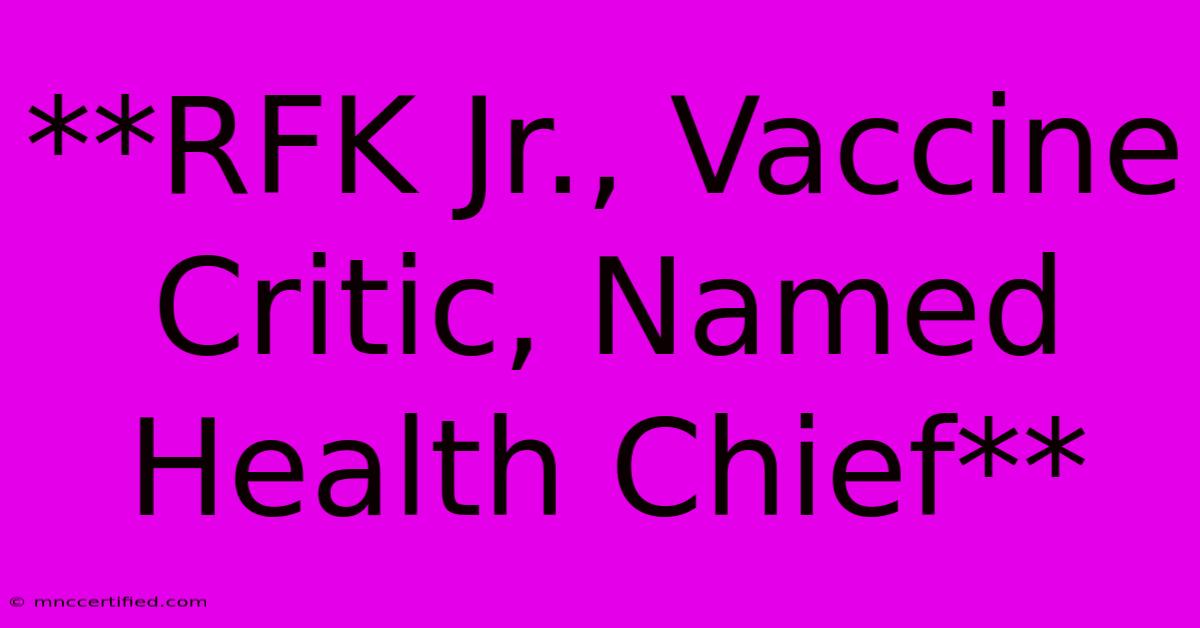**RFK Jr., Vaccine Critic, Named Health Chief**

Table of Contents
RFK Jr., Vaccine Critic, Named Health Chief: A Controversial Appointment
Robert F. Kennedy Jr., a prominent figure in the anti-vaccine movement, has been appointed as the head of the Children's Health Defense (CHD), a non-profit organization dedicated to promoting natural health and addressing environmental health issues. This appointment has sparked significant controversy, raising questions about the organization's stance on vaccines and the potential impact on public health.
A History of Vaccine Skepticism
RFK Jr. has been a vocal critic of vaccines for over two decades, alleging that they are linked to autism and other health issues. He has authored books and published articles promoting these claims, despite a lack of scientific evidence to support them. His views have been widely criticized by medical professionals and public health organizations, who emphasize the safety and effectiveness of vaccines.
The Children's Health Defense and Its Mission
The Children's Health Defense (CHD) was founded in 2010 as the World Mercury Project. It advocates for policies to reduce exposure to mercury and other environmental toxins, particularly in children. The organization has expanded its focus to include other health concerns, including vaccine safety, environmental pollution, and the impact of modern agriculture on health.
Controversial Statements and Public Reaction
RFK Jr.'s appointment as CHD's president has been met with intense criticism from scientists, medical experts, and public health advocates. Critics argue that his appointment undermines the organization's credibility and could have a detrimental impact on public health efforts.
Concerns center around:
- Dissemination of Misinformation: RFK Jr.'s outspoken stance against vaccines could contribute to the spread of misinformation about vaccine safety.
- Erosion of Trust: His appointment may erode public trust in CHD's work and potentially discourage people from seeking essential medical care, including vaccinations.
- Impact on Public Health: The promotion of unfounded claims about vaccines could lead to a decline in vaccination rates, putting children at risk of preventable diseases.
The Importance of Evidence-Based Information
Public health experts emphasize the critical role of evidence-based information in making informed decisions about health and wellness. The World Health Organization (WHO) and other reputable organizations have consistently declared that vaccines are safe and effective, saving millions of lives every year.
It is crucial to rely on evidence-based information from credible sources when making decisions about health, including vaccinations. Consulting medical professionals and seeking information from reputable organizations like the CDC and WHO is essential for ensuring the safety and well-being of individuals and communities.
Ongoing Debate and Implications for Public Health
The appointment of RFK Jr. as head of CHD highlights the ongoing debate surrounding vaccine safety and the importance of critical thinking and responsible information dissemination. As this controversy continues, it is essential to engage in informed discussions based on scientific evidence and the best interests of public health.
Keywords: RFK Jr., vaccine skepticism, Children's Health Defense, anti-vaccine movement, public health, misinformation, vaccination rates, evidence-based information, scientific consensus, CDC, WHO.

Thank you for visiting our website wich cover about **RFK Jr., Vaccine Critic, Named Health Chief** . We hope the information provided has been useful to you. Feel free to contact us if you have any questions or need further assistance. See you next time and dont miss to bookmark.
Featured Posts
-
Draft Pick Trading Fantasy Football
Nov 15, 2024
-
Snow White Star Zegler Sparks Disney Backlash
Nov 15, 2024
-
Greece Vs England Live Three Lions Win
Nov 15, 2024
-
Tate Mc Rae Performance At Canadian Tire Centre
Nov 15, 2024
-
Columbus Weather November Full Moon
Nov 15, 2024